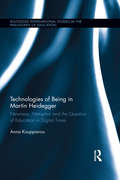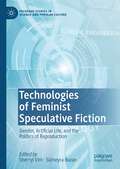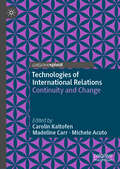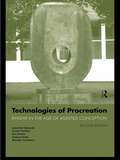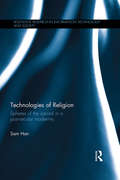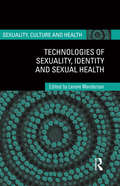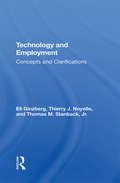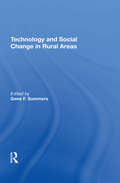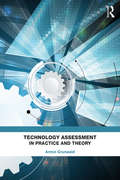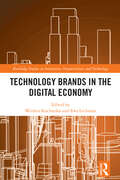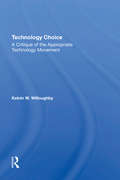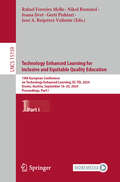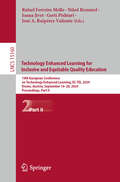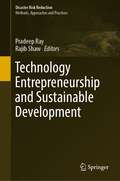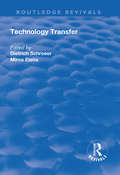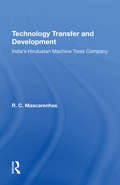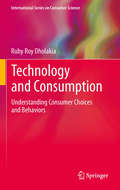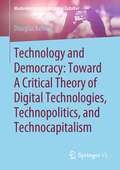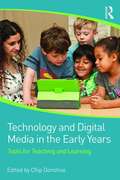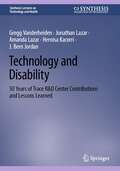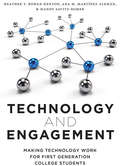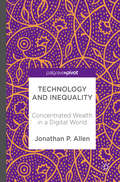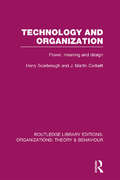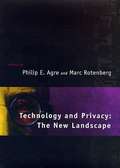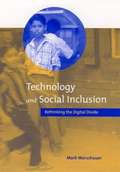- Table View
- List View
Technologies of Being in Martin Heidegger: Nearness, Metaphor and the Question of Education in Digital Times (Routledge International Studies in the Philosophy of Education)
by Anna KouppanouTechnologies of Being in Martin Heidegger attempts to deepen the dialogue between philosophy of education and philosophy of technology, while engaging with the thought of Heidegger, Jacques Derrida and Bernard Stiegler. Through a critical reading of Heidegger’s central notion of nearness, this book argues that thinking is intricately conditioned by technologically produced images, which are themselves interacting with imagination’s schematizing power. The book further discusses how certain metaphorical synthesising processes, which are currently industrialized taking the form of social networking sites and search engines, discretise human behaviour and reorganise it in ways that often marginalise human interpretation and redefine nearness. Finally, it suggests how we might reconceptualise technology and education as processes of human individuation. Technologies of Being in Martin Heidegger will be of great interest to scholars in the fields of philosophy of education, philosophy of technology, literary studies, cognitive linguistics and cognitive neuroscience.
Technologies of Feminist Speculative Fiction: Gender, Artificial Life, and the Politics of Reproduction (Palgrave Studies in Science and Popular Culture)
by Sherryl Vint Sümeyra BuranTechnologies of Feminist Speculative Fiction: Gender, Artificial Life, and the Politics of Reproduction explores how much technology has reshaped feminist conversations in the decades since Donna Haraway’s influential “Cyborg Manifesto” was published. With sections exploring reproductive technologies, new ways of imagining femininity and motherhood via artificial means, queer readings of gender as a social technology, and posthuman visions of a world beyond gender, this book demonstrates how feminist speculative fiction offers an urgently needed response to the intersections of women’s bodies and technology. This collection brings together authors from Europe, Japan, the US and the UK to consider speculative films and texts, reproductive technologies and food futures, and opportunities to rethink family, aging, gender and sexuality, and community through feminist speculative fiction, a social technology for building better futures.
Technologies of International Relations: Continuity And Change
by Michele Acuto Carolin Kaltofen Madeline CarrThis book examines the role of technology in the core voices for International Relations theory and how this has shaped the contemporary thinking of ‘IR’ across some of the discipline’s major texts. Through an interview format between different generations of IR scholars, the conversations of the book analyse the relationship between technology and concepts like power, security and global order. They explore to what extent ideas about the role and implications of technology help to understand the way IR has been framed and world politics are conceived of today. This innovative text will appeal to scholars in Politics and International Relations as well as STS, Human Geography and Anthropology.
Technologies of Procreation: Kinship in the Age of Assisted Conception
by Sarah Franklin Marilyn Strathern Jeanette Edwards Eric Hirsch Frances PriceTechnologies of Procreation bridges the gap between medical technology and cultural values. It looks at the ways in which the 'technologies of procreation' affect society from an anthropological perspective.
Technologies of Religion: Spheres of the Sacred in a Post-secular Modernity (Routledge Research in Information Technology and Society)
by Sam HanBringing together empirical cultural and media studies of religion and critical social theory, Technologies of Religion: Spheres of the sacred in a post-secular modernity investigates powerful entanglement of religion and new media technologies taking place today, taking stock of the repercussions of digital technology and culture on various aspects of religious life and contemporary culture more broadly. Making the argument that religion and new media technologies come together to create "spheres"—environments produced by an architecture of digital technologies of all sorts, from projection screens to social networking sites, the book suggests that prior social scientific conceptions of religious worship, participation, community and membership are being recast. Using the case of the strain of American Christianity called "multi-site," an emergent and growing church-model that has begun to win favor largely among Protestants in the last decade, the book details and examines the way in which this new mode of religiosity bridges the realms of the technological and the physical. Lastly, the book situates and contextualizes these developments within the larger theoretical concerns regarding the place of religion in contemporary capitalism. Technologies of Religion: Spheres of the sacred in a post-secular modernity offers an important contribution to the study of religion, media, technology and culture in a post-secular world.
Technologies of Sexuality, Identity and Sexual Health (Sexuality, Culture and Health)
by Lenore MandersonTechnologies of Sexuality, Identity and Sexual Health highlights the complex ways in which sexuality is expressed and enacted through local ideologies, global identities and material cultures, and their influence on people’s sexual health and well-being. Its impetus is the renewed interest in technology and the ‘social life of things,’ including pharmaceuticals, expanded sexual and related surgery, the growing exploitation of markets for sexual and contraceptive products, and the impact of these on sexual and health practices and outcomes. Organised loosely into three parts, the opening chapters concentrate on female contraception, its availability, and the varied cultural significance attached to the ability to control its use, exploring the politics of reproductive health and birth control, and the ties between technology and power. The middle section turns its attention to men, and the impact of traditional and contemporary concerns about masculinity, and the social and sexual roles of men. The final chapters look at the commonalities across cultural borders and sexual gendered identities – how products and procedures travel, not only through the formal channels of globalisation, but also informally, carried by individuals across cultural and social boundaries through sexual, social and commercial interactions. The volume brings together anthropologists, sociologists and cultural studies scholars, both senior and emerging, from around the globe. Offering an important and topical contribution to the developing global literature on sexuality, sexual identity, culture and health, it is of interest to researchers and advanced students in these areas.
Technology And Employment: Concepts And Clarifications
by Eli Ginzberg Thomas M Stanback Jr Thierry J NoyelleThis volume is the first of four publications that will present the research on technology and employment carried out by Conservation of Human Resources of Columbia University over the past several years. This research was started with a small grant from the Rockefeller Foundation in 1982.
Technology And Social Change In Rural Areas: A Festschrift For Eugene A. Wilkening
by Gene F SummersThe possibility of nuclear war, the failure of the Green Revolution, the capabilities of genetic engineering, and other actual and potential effects of technological innovations have created demands for a more humane application of technology. Addressing this issue, Technology and Social Change in Rural Areas is a clear assessment of the current state of affairs. The book begins with a discussion of the changing paradigms of technology adoption and diffusion, the dynamics of public resistance, and the question of social responsibility in an age of synthetic biology. In subsequent sections, the contributors assess the revolutionary effect of technology on agriculture worldwide and conclude that radically new public policies are essential; expose the transformations of rural life and communities that result from the localized effects of technology and its use as a weapon in world-system politics; and critically examine the appropriate technology movement. The essays are presented to honor Professor Eugene A. Wilkening for his many pioneering and lasting contributions to the study of technology and rural social change. The book includes an intellectual biography of Professor Wilkening written by his long-time colleague and friend, William H. Sewell.
Technology Assessment in Practice and Theory
by Armin GrunwaldTechnological advance affects almost all areas of human life. Rapid digitization, increased mobility, new biotechnologies, and nanotechnology deeply influence, amongst others, industrial production, entertainment, work, military affairs, and individual life. Besides overwhelmingly positive effects on wealth, comfort, innovation, and development, this also raises questions of unintended effects, of tensions with democracy, of the role of citizens, and of its sustainability facing environmental issues. Tools and procedures are needed to cope with this challenging situation. Technology assessment (TA) has been developed more than fifty years ago to enable science, the economy, and society to harvest the potential of new technology to the maximum extent possible and to deal responsibly with possible adverse effects. It was developed more than 50 years ago in the U.S. Congress and has diversified considerably in the meantime. Parliamentary TA in many European states and at the international level, participatory TA at the local and regional levels worldwide, and TA as part of engineering processes are the most relevant fields today. Technology assessment is a growing field of interdisciplinary research and scientific policy advice. This volume (a) gives an overview of motivations of TA, its history and its current practices, (b) develops a fresh theoretical perspective on TA rooted in social theory and philosophy, and (c) draws conclusions from the theoretical perspective for the further development of TA’s practices. It provides the first comprehensive view on the growing field of TA at the international level.
Technology Brands in the Digital Economy (Routledge Studies in Innovation, Organizations and Technology)
by Ewa Lechman Wioleta KucharskaThis edited volume provides deep insight into theoretical and empirical evidence on how digital technologies and high-tech brands are interrelated. It traces the mutual links between these two phenomena, identifies the multidimensionality of interdependencies, and shows the reader how and why new technologies are the driving factors of creation and global dissemination of high-tech brands. In this context, it also refers to various types of economic and social networks that, on the one hand, are the products of digital technologies, while on the other enforce global visibility of high-tech brands. The book contributes to the present state of knowledge, offering the reader broad evidence on how digital technologies impact the process of high-tech brands' nascence and how their growing role and global exposure influence networked economies and societies. It sets out to deliver a bridge between brand management and economical approaches to understanding how digital technologies and high-tech brands are interrelated. This multidisciplinary approach creates a complex compilation of different views and perspectives that sheds new light on the high-tech brands' phenomena of being an input and output of technology-driven economies. Technology Brands in the Digital Economy is written for scholars and researchers from a wide variety of disciplines but especially for those addressing issues of brands and economic development and growth, social development, and the role of technological progress in broadly defined socio-economic progress. It will also be an invaluable source of knowledge for graduate and postgraduate students in a variety of areas such as economic and social development, information and technology, worldwide studies, social policy, and comparative economics.
Technology Choice: A Critique Of The Appropriate Technology Movement
by Kelvin W WilloughbyThis book attempts to provide a theoretical framework for answering difficult questions evoked by the concept of technology choice primarily by conducting a review of the Appropriate Technology movement and its ideas and experiments.
Technology Enhanced Learning for Inclusive and Equitable Quality Education: 19th European Conference on Technology Enhanced Learning, EC-TEL 2024, Krems, Austria, September 16–20, 2024, Proceedings, Part I (Lecture Notes in Computer Science #15159)
by Ioana Jivet Rafael Ferreira Mello Nikol Rummel Gerti Pishtari José A. Ruipérez ValienteThe two-volume set LNCS 15159 and 15160 constitutes the proceedings of 19th European Conference on Technology Enhanced Learning, EC-TEL 2024, which took place in Krems, Austria, in September 2024. The 37 full papers, 25 poster papers, and 10 demo papers presented in the proceedings were carefully reviewed and selected from 140 submissions for research papers, and 26 poster and 19 demo submissions. They focus on effective technology adoption in educational settings, ethical concerns, and the possible digital divide these technologies could create. The theme for the 2024 conference aimed to explore the role of Technology-Enhanced Learning (TEL) in this critical context and in achieving the United Nations’ Sustainable Development Goal for education: “Ensure inclusive and equitable quality education and promote lifelong learning opportunities for all.”
Technology Enhanced Learning for Inclusive and Equitable Quality Education: 19th European Conference on Technology Enhanced Learning, EC-TEL 2024, Krems, Austria, September 16–20, 2024, Proceedings, Part II (Lecture Notes in Computer Science #15160)
by Ioana Jivet Rafael Ferreira Mello Nikol Rummel Gerti Pishtari José A. Ruipérez ValienteThe two-volume set LNCS 15159 and 15160 constitutes the proceedings of 19th European Conference on Technology Enhanced Learning, EC-TEL 2024, which took place in Krems, Austria, in September 2024. The 37 full papers, 25 poster papers, and 10 demo papers presented in the proceedings were carefully reviewed and selected from 140 submissions for research papers, and 26 poster and 19 demo submissions. They focus on effective technology adoption in educational settings, ethical concerns, and the possible digital divide these technologies could create. The theme for the 2024 conference aimed to explore the role of Technology-Enhanced Learning (TEL) in this critical context and in achieving the United Nations’ Sustainable Development Goal for education: “Ensure inclusive and equitable quality education and promote lifelong learning opportunities for all.”
Technology Entrepreneurship and Sustainable Development (Disaster Risk Reduction)
by Rajib Shaw Pradeep RayThis book discusses the need for entrepreneurship for sustainable development from the perspective of Asia, the fastest growing region in the world. The world is now witnessing a spectacular rise of technology entrepreneurship, involving mobile phones, artificial intelligence, geospatial information systems and social media. On the other hand, governments all over the world, particularly those in low and medium income countries, are facing severe resource constraints in developing the livelihood and well-being of citizens. Although many non-government organizations (NGOs) have worked on various development projects in a number of social sectors such as health, education, disabilities, poverty alleviation and environment, there is still substantial scope for technological innovation, including more efficient, effective and user-friendly solutions in different parts of the world. This book is organized into 2 parts and consists of 17 chapters. The first part explores education and well-being, and the second part discusses the climate, environment and disaster management.
Technology Transfer (Isodarco Ser.)
by Dietrich Schroeer Mirco ElenaThis title was first published in 2000: The theme of this collection of essays is "technology transfer". The topic has three major aspects: the interchange of technologies between military and civilian applications - "spin-off", "dual use", "conversion" and "diversification" fall under this heading; the proliferation of military arms, which could occur either through arms races between developed nations or through the transfer of military technology from developed arms industries to less developed nations - "proliferation", "arms races" and "arms control agreements" fall under this heading; and the transfer of civilian technologies from developing nations to less developed nations. The expression, "North-South transfer" and the idea of "development" come under this final section. The essays offer examination of all three aspects.
Technology Transfer And Development: India's Hindustan Machine Tools Company
by R. C. Mascarenhas R C MascarenhasIn most Third World nations, importing technology from other countries is considered vital to industrialization and economic development. This book examines the processes of technology transfer and development by tracing how Hindustan Machine Tools—a public enterprise in India—successfully collaborated with manufacturers from industrialized nations in its growth from a single factory to a diversified industrial complex. The author critically analyzes the company's overall strategies for diversification and expansion and its approaches to selecting, acquiring, absorbing, and generating technology and to developing appropriate management. He also points to important relationships between “policy efficiency†and “administrative efficiency†and discusses socioeconomic and cultural factors that can obstruct the successful development and operation of an industrial enterprise in a developing country.
Technology and Consumption
by Ruby Roy DholakiaTechnology and Household Consumption is a comprehensive text that provides insights into technology's impact on consumer behavior and the household environment. Consumption and consumer behavior has become a very important subject of study that is now covered in many disciplines including family economics, culture studies, and feminist/women studies. In the first section, this book provides a historical perspective on how consumer behaviors have changed because of technology and how technology itself has changed. Data on ownership and expenditures is detailed in describing the penetration of technology in the household and changes over time. In the examination of demographics and social changes, an emphasis is placed on women and children. As it is important to understand the entry paths and factors that influence them, the book also introduces a research framework to understanding the adoption and utilization of household technologies. In the second section, the book examines specific household technologies and consumption experiences including shopping choices and behaviors, entertainment outlets and availability, communications technologies, and working at home. The book concludes with a section on the relationships between marketers and consumers.
Technology and Democracy: Toward A Critical Theory of Digital Technologies, Technopolitics, and Technocapitalism (Medienkulturen im digitalen Zeitalter)
by Douglas KellnerAs we enter a new millennium, it is clear that we are in the midst of one of the most dramatic technological revolutions in history that is changing everything from the ways that we work, communicate, participate in politics, and spend our leisure time. The technological revolution centers on computer, information, communication, and multimedia technologies, is often interpreted as the beginnings of a knowledge or information society, and therefore ascribes technologies a central role in every aspect of life. This Great Transformation poses tremendous challenges to critical social theorists, citizens, and educators to rethink their basic tenets, to deploy the media in creative and productive ways, and to restructure the workplace, social institutions, and schooling to respond constructively and progressively to the technological and social changes that we are now experiencing.
Technology and Digital Media in the Early Years: Tools for Teaching and Learning
by Chip DonohueThis book provides strategies, theoretical frameworks, links to research evidence, descriptions of best practice, and resources to develop essential digital literacy knowledge, skills, and experiences for early childhood educators in the digital age.
Technology and Disability: 50 Years of Trace R&D Center Contributions and Lessons Learned (Synthesis Lectures on Technology and Health)
by Jonathan Lazar Gregg Vanderheiden Amanda Lazar Hernisa Kacorri J. Bern JordanThis book outlines the development of the Trace R&D Center as an institution for furthering accessible and assistive technologies. The book walks readers through the Center’s nascent attempts to solve individual challenges with augmentative communication devices through contemporary efforts to establish global frameworks and infrastructures for accessibility. This book is premised on the Center’s mission to maximize the potential of people with disabilities by harnessing evolving technologies while at the same time dismantling the barriers created by those same technological advancements. Readers will learn how this has been done in the past and why this practice should be a fundamental and integrated feature in new technology planning and implementation. The book touches on pre-internet technologies before exploring the huge implications of, first, the personal computer and, second, the Internet. In parallel with the massive growth in scale rendered by the launch of the Web, the book traces the expansion of the Center’s focus from the individual to the universal, particularly in working to establish accessibility standards and infrastructures. Learning from the successes and failures of the Center, the book outlines many past challenges and future directions for the development of technologies for people with disabilities from the research and industry perspectives.
Technology and Engagement: Making Technology Work for First Generation College Students
by Mandy Savitz-Romer Heather T. Rowan-Kenyon Ana M. Martínez AlemánTechnology and Engagement is based on a four-year study of how first generation college students use social media, aimed at improving their transition to and engagement with their university. Through web technology, including social media sites, students were better able to maintain close ties with family and friends from home, as well as engage more with social and academic programs at their university. This ‘ecology of transition’ was important in keeping the students focused on why they were in college, and helped them become more integrated into the university setting. By showing the gains in campus capital these first-generation college students obtained through social media, the authors offer concrete suggestions for how other universities and college-retention programs can utilize the findings to increase their own retention of first-generation college students.
Technology and Inequality
by Jonathan P. AllenThis book will summarize what we know about technology and inequality across disciplines, and seek out new ways to analyze this relationship based on technology and business practices, with the objective of restoring digital technology as an engine of opportunity. Besides the unique focus on the role of technology in inequality, the book will have a unifying theme of tracing wealth creation and wealth capture in the technology sector, and relating specific practices--what technology companies actually do--to larger shifts in wealth and power. A clear conceptual framework will be used to analyze key industry case studies: search engines, social media, and the 'sharing' economy.
Technology and Organization: Power, Meaning and Deisgn (Routledge Library Editions: Organizations)
by Harry Scarbrough J. Martin CorbettIn this important MBA text the authors adopt a highly integrated approach. Using the three conceptual lenses of power, meaning and design they explore fully the many different ways in which technology and organizations interact. They highlight the major debates within these competing perspectives and argue that the flow of knowledge and ideas within and between organizations is crucial in shaping technologies and organizations alike.
Technology and Privacy: The New Landscape
by Philip E. Agre Marc RotenbergPrivacy is the capacity to negotiate social relationships by controlling access to personal information. As laws, policies, and technological design increasingly structure people's relationships with social institutions, individual privacy faces new threats and new opportunities. Over the last several years, the realm of technology and privacy has been transformed, creating a landscape that is both dangerous and encouraging. Significant changes include large increases in communications bandwidths; the widespread adoption of computer networking and public-key cryptography; mathematical innovations that promise a vast family of protocols for protecting identity in complex transactions; new digital media that support a wide range of social relationships; a new generation of technologically sophisticated privacy activists; a massive body of practical experience in the development and application of data-protection laws; and the rapid globalization of manufacturing, culture, and policy making. The essays in this book provide a new conceptual framework for the analysis and debate of privacy policy and for the design and development of information systems. The authors are international experts in the technical, economic, and political aspects of privacy; the book's strength is its synthesis of the three. The book provides equally strong analyses of privacy issues in the United States, Canada, and Europe. Contributors: Philip E. Agre, Victoria Bellotti, Colin J. Bennett, Herbert Burkert, Simon G. Davies, David H. Flaherty, Robert Gellman, Viktor Mayer-Schouml;nberger, David J. Phillips, Rohan Samarajiva.
Technology and Social Inclusion: Rethinking the Digital Divide
by Mark WarschauerMuch of the discussion about new technologies and social equality has focused on the oversimplified notion of a "digital divide." Technology and Social Inclusion moves beyond the limited view of haves and have-nots to analyze the different forms of access to information and communication technologies. Drawing on theory from political science, economics, sociology, psychology, communications, education, and linguistics, the book examines the ways in which differing access to technology contributes to social and economic stratification or inclusion. The book takes a global perspective, presenting case studies from developed and developing countries, including Brazil, China, Egypt, India, and the United States. A central premise is that, in today's society, the ability to access, adapt, and create knowledge using information and communication technologies is critical to social inclusion. This focus on social inclusion shifts the discussion of the "digital divide" from gaps to be overcome by providing equipment to social development challenges to be addressed through the effective integration of technology into communities, institutions, and societies. What is most important is not so much the physical availability of computers and the Internet but rather people's ability to make use of those technologies to engage in meaningful social practices.
